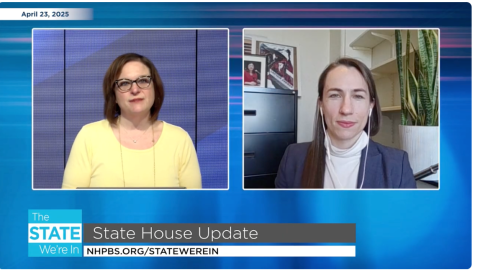Rudman Center Director Anna Brown Discusses Statehouse Bills Likely – And Unlikely – to Advance to the Governor’s Desk.

Melanie Plenda, host of the State We're In, and Anna Brown, executive director of the Rudman Center.
Anna Brown, executive director of the Warren B. Rudman Center for Justice, Leadership & Public Service, highlighted some of the prominent bills under discussion in the final months of this legislative session during a recent episode of The State We’re In on NH PBS. Brown is also executive director of Citizens Count. Watch the full interview here.
Among the issues addressed by both legislative bodies: expansion of eligibility for Education Freedom Accounts, a parental bill of rights, bans on sanctuary cities and towns, and requiring local authorities to cooperate with federal immigration enforcement.
Earlier this month, all active House bills moved to the Senate, and vice versa, on what is known as Crossover Day. Bills passed by both houses in the coming months will then move to Governor Kelly Ayotte’s desk.
Some surprising areas of bipartisan agreement emerged in the state Senate, Brown said, including several bills pushing back on restrictive zoning at the local level.
“Historically the state Senate has been hesitant to say what cities and towns can and can’t do when it comes to minimum lot sizes, or parking requirements and so on. That was surprising to me. It was a coalition of Democrats and Republicans in favor and also Republicans and Democrats against.”
Brown attributes this change to two developments: “We have new state senators. Some are from Manchester, the biggest city in this state, so they’ve really witnessed housing pressures, some of which is resulting in higher homelessness for example. There’s also been a real push from the public and a demand that we have to respond to this.”
Also surprising, Brown said, was support for a Senate bill that would increase eligibility for free meals in schools. “It’s not the full-blown expansion that Democrats have been advocating for in the past but it was still movement forward on an issue that I wasn’t sure was going to change this year.”
Bills unlikely to gain support, she said, include a House bill expanding legal use of marijuana and another that would legalize drug-testing equipment, such as fentanyl strips, a harm-reduction approach that has been credited with helping to reduce the risk of overdose.
Among the more heated debates, Brown said, involved an education bill that would prohibit any material “harmful to minors” in schools.
“That’s a pretty subjective phrase. The bill defines the material to include various content related to sex and violence. This is definitely one of those trickier social issues. Is this a book ban? Is this about protecting children from groomers? You’ll hear a lot of heated language.”
Looming over these discussions is the state budget. The New Hampshire House approved a $16 billion budget that reduces state spending across the board and differs significantly from Ayotte’s proposed spending plan. Ayotte has indicated she will work with the Senate to restore many of those cuts. The House and Senate will likely meet to negotiate the final budget in June.